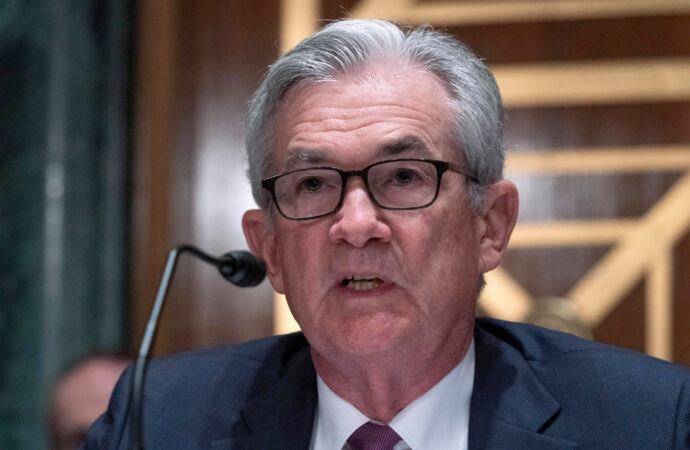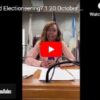Washington (AP) —The split Federal Reserve Board meets this week as inflation is unpleasantly high and the COVID-19 Delta variant raises economic concerns, when and how ultra-low interest rate policies Discuss if you should get it back. So far, the US economy has been booming in the wake of the pandemic recession, and the pace
Washington (AP) —The split Federal Reserve Board meets this week as inflation is unpleasantly high and the COVID-19 Delta variant raises economic concerns, when and how ultra-low interest rate policies Discuss if you should get it back.
So far, the US economy has been booming in the wake of the pandemic recession, and the pace of employment is healthy, so Fed policy makers may soon come closer to action. In particular, authorities are expected to discuss when and how to delay the purchase of $ 120 billion in bonds per month. This is a pandemic-era policy aimed at keeping long-term lending rates low and promoting borrowing and spending.
This week’s meeting will be held against the backdrop of dangerous policies bet by Federal Reserve Board Chairman Jerome Powell. Powell is betting that central banks can design very delicate tasks. From March 2020, the Fed’s short-term benchmark rate will remain close to zero and will not encourage high levels of persistent seizures until the employment market is fully restored. inflation.
However, interests in the bet are rising, with consumer prices rising 5.4% in June from a year ago, the largest rise in 13 years. Last month’s surge recorded an unexpectedly large price increase for the fourth straight month, raising the risk that sustained inflation will undermine the value of recent salary increases and undermine economic recovery.
The main concern is that the Fed will be too slow and aggressive in responding to high inflation, causing interest rates to skyrocket and perhaps another recession. Last week, Congressional Republicans asked Powell questions about inflation, primarily blaming President Joe Biden’s $ 1.9 trillion stimulus package enacted in March.
In his testimony, Powell primarily supported his view that higher inflation proved to be temporary. His reasoning is that recent highs in used and new cars, hotel rooms, airline tickets, etc. were mainly caused by supply shortages related to the rapid resumption of the economy. But he also stated more clearly than before that the Fed wouldn’t hesitate to raise rates if the Fed determined that inflation was out of control.
After a period of broad consensus during the pandemic crisis, Fed policy makers seem to be divided on when to start reducing monthly bond purchases, or “tapering” in Fed terminology. Several regional Fed governors will soon support tapering, including James Bullard of the St. Louis Fed, Patrick Harker of the Philadelphia Fed, and Robert Kaplan of the Dallas Fed.
Powell said the central bank wants to see “substantial further progress” towards the goal of maximum employment and price stability before considering reducing bond purchases. To make up for the year when inflation was below 2%, according to Powell, the Fed shows signs that inflation is slightly above the average inflation target of 2% and is above inflation for an unspecified period of time. I want Inflation has exceeded 2% in recent months as consumer demand has outstripped supply of goods and services in some industries.
Powell suggested in a parliamentary testimony last week that the economy was “still a long way off” as it achieved its progress. When the Fed issues a policy statement on Wednesday and Powell holds a press conference, a signal that such progress is near could mean that the Fed is approaching a reduction in bond purchases.
Nathan Sheets, chief economist at PGIM Bonds and former Fed director of international finance, said the Fed’s split reflects two very different views on the economy. Officials in favor of the early taper may be focusing on the current high inflation levels and the fact that the economy has almost returned to its pre-pandemic scale.
Employment is strong, according to Sheets, mainly controlled by a shortage of workers rather than a shortage of demand. From this perspective, the Fed cannot do much about labor supply.
“Ultimately, the economy is much better than it was a year ago,” the spreadsheet said. “It’s getting harder and harder to explain why the Fed needs to keep buying $ 120 billion in assets a month.”
Still, Powell and other Federal Reserve Board leaders, especially Richard Clarida, Vice-Chairman of the Federal Reserve Bank, and John Williams, President of the Federal Reserve Bank of New York, slowly moved toward withdrawing financial support. I’ll stick to the approach I did, said Sheets.
According to Sheets, how the highly contagious and rapidly spreading delta mutant of the coronavirus will affect the U.S. and global economies, or how the job market will change in the coming months. It is not clear yet. Employment could accelerate in September as schools reopen, more parents can find employment, and the expanded unemployment program expires.
“There’s no reason we’re in a hurry here,” the spreadsheet summed up a likely view of leadership. Bond markets have shown much less concern about future inflation, with yields on 10-year government bonds down about 0.5 percentage points from spring to about 1.28 percent.
This also gives the Fed more time to consider its options, the spreadsheet said.
Powell said the Fed communicated its intention to taper “long before” doing so.
Goldman Sachs economist David Mericle said, based on historical practice, central banks are likely to indicate their intentions for the two meetings before announcing the move. Therefore, Mericle predicts that the Fed will provide the first clear hint of tapering at its September meeting, then give another signal in November and announce the actual taper in December.
Federal Government | WGN Radio 720 to Discuss the Retreat of Economic Assistance with Rising Inflation
Source link Federal Government | WGN Radio 720 to Discuss the Retreat of Economic Assistance with Rising Inflation


























Leave a Comment
Your email address will not be published. Required fields are marked with *